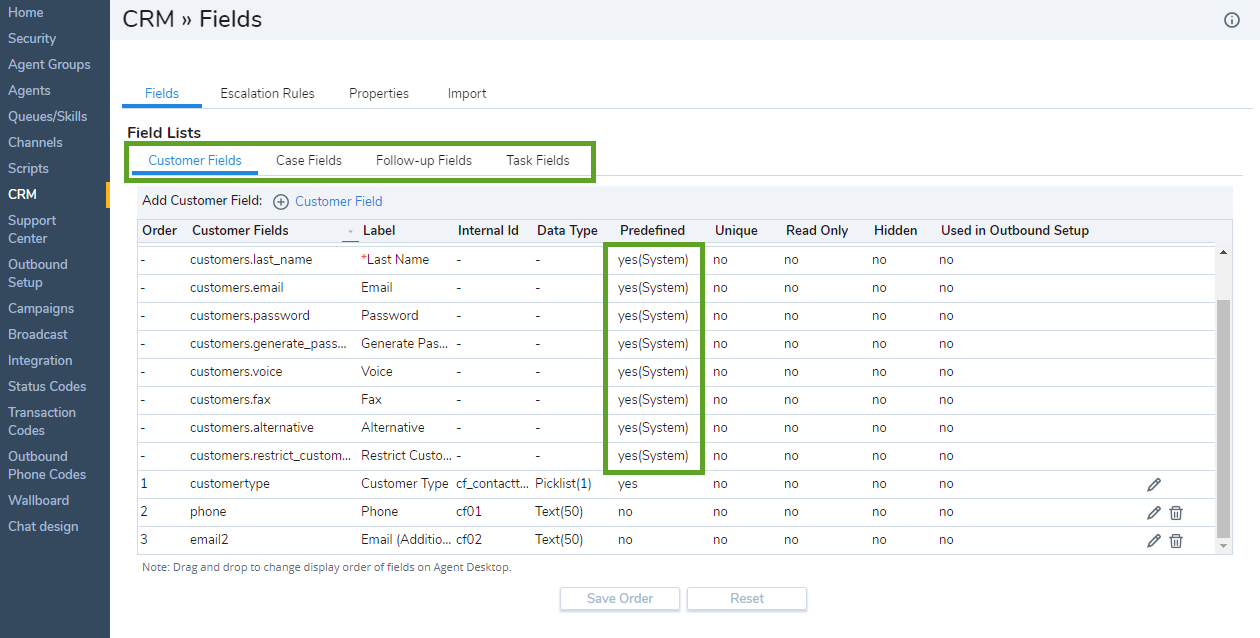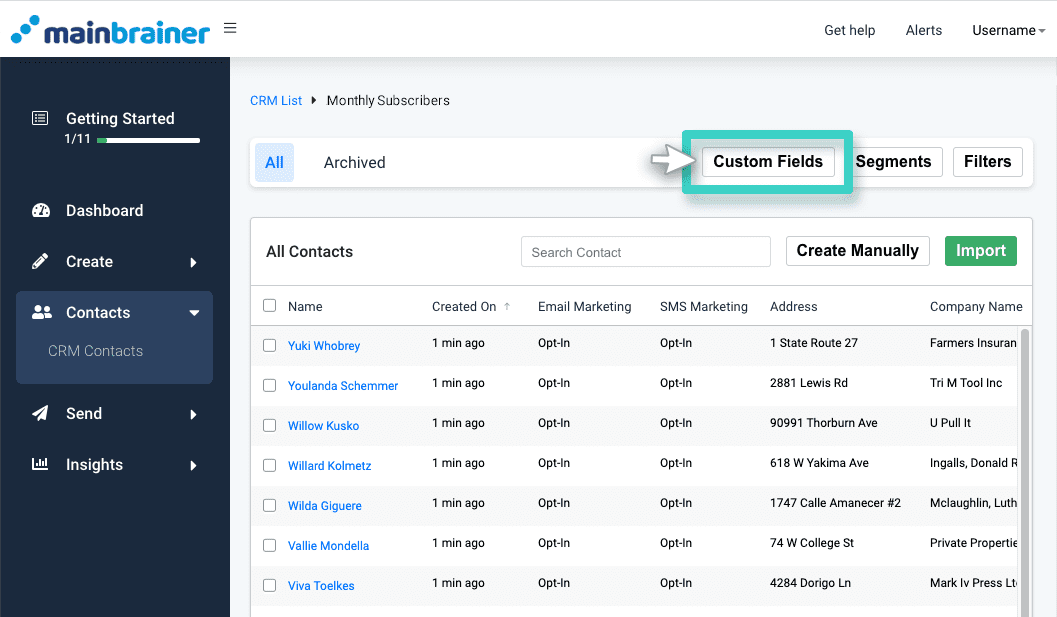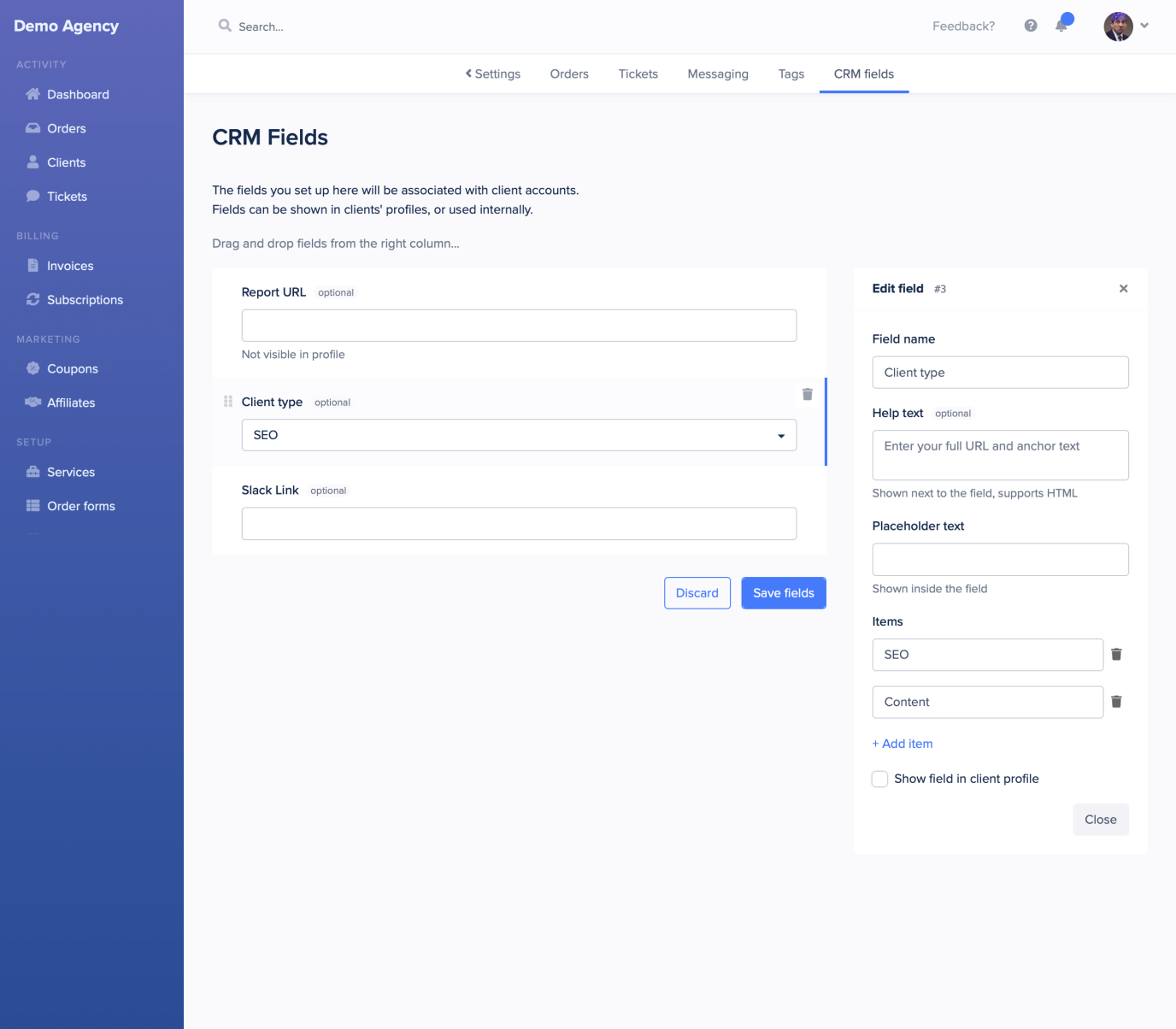Crm field – Delving into the realm of Customer Relationship Management (CRM), we embark on a journey that unveils the significance and transformative power of this field in modern business landscapes. CRM empowers organizations to cultivate enduring customer relationships, optimize sales performance, and drive overall business success.
Join us as we explore the intricacies of CRM, unraveling its components, benefits, challenges, and future outlook.
The content of the second paragraph that provides descriptive and clear information about the topic
Customer Relationship Management (CRM) Field Overview: Crm Field
Customer Relationship Management (CRM) is a comprehensive approach to managing interactions with current and potential customers. It involves the collection, organization, and analysis of customer data to improve the overall customer experience and drive business growth.
In today’s competitive business landscape, CRM has become increasingly important. It allows businesses to:
- Understand customer needs and preferences
- Personalize marketing and sales efforts
- Improve customer service and support
- Increase customer loyalty and retention
Key Components of a CRM System

A Customer Relationship Management (CRM) system is a comprehensive software solution that enables businesses to manage and track their interactions with customers. It comprises several core components that work together to provide a centralized platform for managing customer data, interactions, and relationships.
The key components of a CRM system include:
- Customer Database:Stores and manages customer data, including contact information, demographics, purchase history, and communication preferences.
- Sales Management:Automates and streamlines sales processes, such as lead generation, tracking, and forecasting.
- Marketing Automation:Manages marketing campaigns, including email marketing, social media marketing, and content marketing.
- Customer Service:Provides tools for managing customer support interactions, including ticketing, knowledge base, and live chat.
- Reporting and Analytics:Generates reports and insights on customer behavior, sales performance, and marketing effectiveness.
These components work together to provide a comprehensive view of customer interactions and enable businesses to:
- Improve customer satisfaction and loyalty
- Increase sales and marketing effectiveness
- Optimize customer service
- Gain valuable insights into customer behavior
Types of CRM Systems

CRM systems can be categorized into various types based on their functionality, deployment model, and target audience. Each type offers unique advantages and drawbacks, catering to specific business needs and requirements.
Operational CRM
Operational CRM focuses on automating and streamlining day-to-day customer interactions and transactions. It includes:
- Sales force automation (SFA): Manages sales activities, tracks leads, and closes deals.
- Marketing automation: Automates marketing campaigns, segments customers, and generates leads.
- Customer service automation: Provides support channels, resolves inquiries, and tracks customer satisfaction.
Analytical CRM
Analytical CRM leverages data analysis to gain insights into customer behavior, trends, and preferences. It involves:
- Data mining: Extracts valuable information from large datasets to identify patterns and trends.
- Reporting and analytics: Generates reports and dashboards to visualize and analyze customer data.
- Customer segmentation: Divides customers into distinct groups based on demographics, behavior, and preferences.
Collaborative CRM
Collaborative CRM enables seamless collaboration and information sharing among different departments within an organization. It includes:
- Team collaboration: Facilitates communication and coordination between sales, marketing, and customer service teams.
- Partner relationship management (PRM): Manages relationships with external partners and channels.
- Social CRM: Integrates social media channels into CRM systems to track customer interactions and feedback.
Strategic CRM
Strategic CRM aligns CRM initiatives with overall business objectives and long-term growth strategies. It involves:
- Customer lifetime value (CLTV) analysis: Calculates the potential revenue and profitability of customers over their lifetime.
- Customer retention management: Develops strategies to retain existing customers and reduce churn.
- Customer acquisition cost (CAC) analysis: Tracks the costs associated with acquiring new customers.
Cloud-based CRM
Cloud-based CRM systems are hosted and managed by third-party providers. They offer:
- Accessibility: Accessible from anywhere with an internet connection.
- Scalability: Easily scalable to meet changing business needs.
- Cost-effectiveness: Lower upfront costs compared to on-premise systems.
On-premise CRM
On-premise CRM systems are installed and managed on a company’s own servers. They provide:
- Control: Full control over data and customization.
- Security: Enhanced security measures due to in-house hosting.
- Customization: Highly customizable to meet specific business requirements.
Benefits of Implementing a CRM System

Customer Relationship Management (CRM) systems offer numerous benefits to businesses of all sizes. By centralizing customer data, automating processes, and providing valuable insights, CRM systems can help businesses improve customer satisfaction, sales performance, and overall business efficiency.
Increased Customer Satisfaction
CRM systems help businesses track customer interactions across all channels, providing a complete view of each customer’s history. This enables businesses to personalize interactions, resolve issues quickly, and proactively address customer needs. According to a study by Salesforce, companies that use CRM systems see a 25% increase in customer satisfaction.
Improved Sales Performance
CRM systems provide sales teams with real-time visibility into the sales pipeline, allowing them to track progress, identify opportunities, and close deals faster. Automated workflows and lead scoring tools help sales teams prioritize prospects and nurture relationships, leading to increased conversion rates.
A study by HubSpot found that companies that use CRM systems experience a 12% increase in sales productivity.
Enhanced Business Efficiency
CRM systems automate many tasks that were previously manual, such as data entry, email marketing, and appointment scheduling. This frees up employees to focus on more strategic initiatives and improves overall productivity. A study by McKinsey & Company found that companies that implement CRM systems see a 20% increase in operational efficiency.
Challenges of CRM Implementation
Implementing a CRM system can be a complex and challenging process. Organizations may encounter various obstacles throughout the implementation journey. It is crucial to identify and address these challenges proactively to ensure a successful implementation.
Common Challenges
- Data Quality and Integration:Ensuring data accuracy and consistency across multiple sources can be a significant challenge. Integrating data from disparate systems and maintaining its quality is essential for effective CRM.
- User Adoption and Training:Resistance to change and lack of user understanding can hinder CRM adoption. Providing comprehensive training and support is crucial to encourage user engagement and maximize system utilization.
- Process Alignment:Implementing a CRM system requires aligning business processes with the system’s capabilities. Organizations must adapt their workflows and procedures to leverage the system’s functionalities effectively.
- Technical Issues:System downtime, performance issues, and integration challenges can disrupt CRM operations. Robust infrastructure and reliable technical support are necessary to minimize these disruptions.
- Budget and Resource Constraints:CRM implementation can be resource-intensive, requiring significant investment in software, hardware, and training. Organizations must carefully plan and allocate resources to ensure a cost-effective implementation.
Strategies and Best Practices, Crm field
- Data Management:Establish clear data governance policies, implement data cleansing and standardization processes, and utilize data integration tools to ensure data quality.
- User Engagement:Conduct thorough user training, involve stakeholders in the implementation process, and provide ongoing support to promote adoption and address user concerns.
- Process Optimization:Analyze existing processes, identify areas for improvement, and align them with CRM capabilities to streamline operations.
- Technical Infrastructure:Invest in reliable hardware and software, implement robust security measures, and establish a comprehensive support plan to minimize technical disruptions.
- Financial Planning:Develop a realistic budget, secure necessary funding, and allocate resources wisely to ensure a cost-effective implementation.
Real-World Examples
- Salesforce:Salesforce’s successful CRM implementation enabled them to centralize customer data, improve sales productivity, and enhance customer satisfaction.
- HubSpot:HubSpot’s CRM system helped them streamline their marketing and sales processes, resulting in increased lead generation and improved customer engagement.
- Zendesk:Zendesk’s CRM implementation transformed their customer support operations, providing a seamless and personalized experience for their customers.
CRM Data Management

Effective CRM data management is crucial for organizations to maximize the benefits of their CRM systems. It involves collecting, organizing, and maintaining customer data to ensure its accuracy, consistency, and compliance with regulations.
Strategies for collecting customer data include surveys, customer interactions, social media monitoring, and web analytics. Once collected, data should be organized into a central repository, such as a CRM database, to facilitate easy access and analysis.
Data Accuracy and Compliance
Ensuring data accuracy is essential for reliable decision-making and customer satisfaction. Organizations can implement data validation rules, conduct regular data audits, and train staff on data entry best practices.
Compliance with regulations, such as the General Data Protection Regulation (GDPR), is also crucial. Organizations must obtain consent from customers for data collection, provide transparency about data usage, and enable customers to access and correct their personal information.
CRM Analytics and Reporting
CRM analytics empower businesses to make informed decisions by leveraging data collected through their CRM systems. These analytics provide valuable insights into customer behavior, preferences, and trends.
CRM reports and dashboards present this data in a user-friendly format, enabling businesses to track key metrics, identify areas for improvement, and optimize their customer interactions.
CRM Data Analysis
CRM data can be analyzed to identify trends, forecast demand, and optimize marketing campaigns. For instance, by analyzing customer purchase history, businesses can identify patterns and predict future demand. This information can help them optimize inventory levels and avoid stockouts.
Examples of Valuable CRM Reports
- Sales pipeline reports: Track the progress of sales opportunities through the sales pipeline.
- Customer churn reports: Identify customers at risk of leaving and develop strategies to retain them.
- Marketing campaign performance reports: Measure the effectiveness of marketing campaigns and identify areas for improvement.
CRM Integration with Other Systems
Integrating CRM with other business systems is crucial for a comprehensive view of customer interactions and streamlining business processes. It enables organizations to connect customer data with operational and analytical systems, enhancing collaboration and improving decision-making.
Integrating CRM with ERP
Enterprise Resource Planning (ERP) systems manage core business processes like finance, supply chain, and manufacturing. Integrating CRM with ERP provides a unified platform for managing customer data, orders, and inventory. This integration streamlines order processing, reduces errors, and improves customer satisfaction by providing real-time visibility into customer accounts and order status.
Integrating CRM with Marketing Automation
Marketing automation systems help automate marketing campaigns and track customer interactions. Integrating CRM with marketing automation allows businesses to align sales and marketing efforts, personalize customer communications, and track the effectiveness of marketing campaigns. This integration enables targeted marketing campaigns, lead nurturing, and improved customer engagement.
Integrating CRM with Other Relevant Systems
CRM can also be integrated with other relevant systems, such as customer support, e-commerce platforms, and social media monitoring tools. This integration creates a comprehensive view of customer interactions across all channels, enabling businesses to provide seamless customer experiences, resolve issues promptly, and gain insights into customer behavior.
Benefits of CRM Integration
Successful CRM integrations have resulted in numerous benefits, including:
- Improved customer service by providing a complete view of customer interactions
- Increased sales productivity by streamlining lead management and opportunity tracking
- Enhanced collaboration between sales, marketing, and customer support teams
- Reduced operational costs by automating processes and eliminating data silos
- Improved decision-making based on comprehensive customer data and analytics
CRM Trends and Future Outlook
The CRM industry is constantly evolving, with new trends emerging all the time. These trends are shaping the future of CRM technology and practices, and businesses need to be aware of them in order to stay ahead of the curve.
One of the most important trends in CRM is the rise of artificial intelligence (AI). AI is being used to automate a variety of tasks in CRM, from lead generation to customer service. This is freeing up CRM users to focus on more strategic tasks, such as building relationships with customers and developing new sales opportunities.
Another major trend in CRM is the increasing use of cloud-based solutions. Cloud-based CRM systems are more affordable and easier to use than on-premise systems, and they offer a number of advantages, such as increased flexibility and scalability.
The Future of CRM
The future of CRM is bright. CRM systems are becoming more powerful and affordable, and they are being used by businesses of all sizes to improve customer relationships and drive sales. Here are a few predictions for the future of CRM:
- AI will continue to play a major role in CRM, automating even more tasks and providing businesses with new insights into their customers.
- Cloud-based CRM systems will become even more popular, as businesses realize the benefits of increased flexibility and scalability.
- CRM systems will become more integrated with other business systems, such as ERP and marketing automation systems.
- CRM systems will become more personalized, providing businesses with the ability to tailor their CRM strategies to the specific needs of their customers.
CRM is an essential tool for businesses of all sizes. By understanding the trends that are shaping the future of CRM, businesses can position themselves to take advantage of the latest technologies and practices.
Ultimate Conclusion

In conclusion, the CRM field stands as a cornerstone of contemporary business practices, enabling organizations to forge stronger customer connections, streamline operations, and achieve unparalleled growth. As technology continues to evolve, CRM will undoubtedly remain at the forefront of innovation, empowering businesses to navigate the ever-changing landscape and thrive in the digital age.
Key Questions Answered
What are the key benefits of implementing a CRM system?
CRM systems offer a multitude of benefits, including improved customer satisfaction, enhanced sales performance, streamlined marketing campaigns, and increased operational efficiency.
What are the common challenges faced during CRM implementation?
Common challenges include data integration issues, resistance to change, and lack of proper training. However, with careful planning and execution, these challenges can be effectively overcome.
